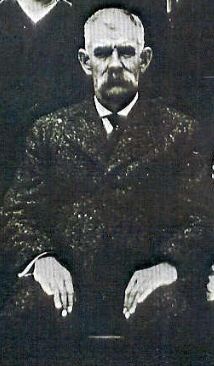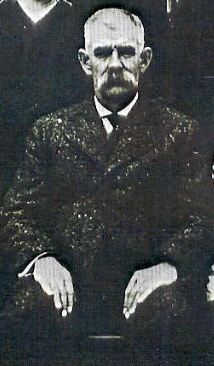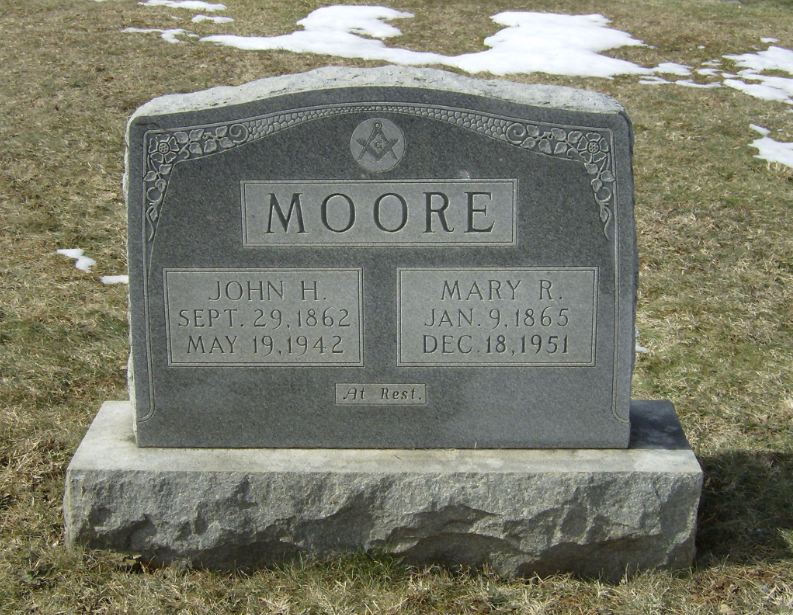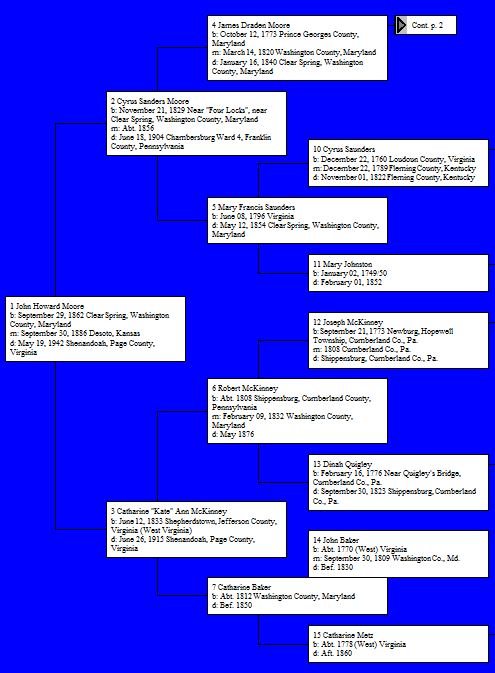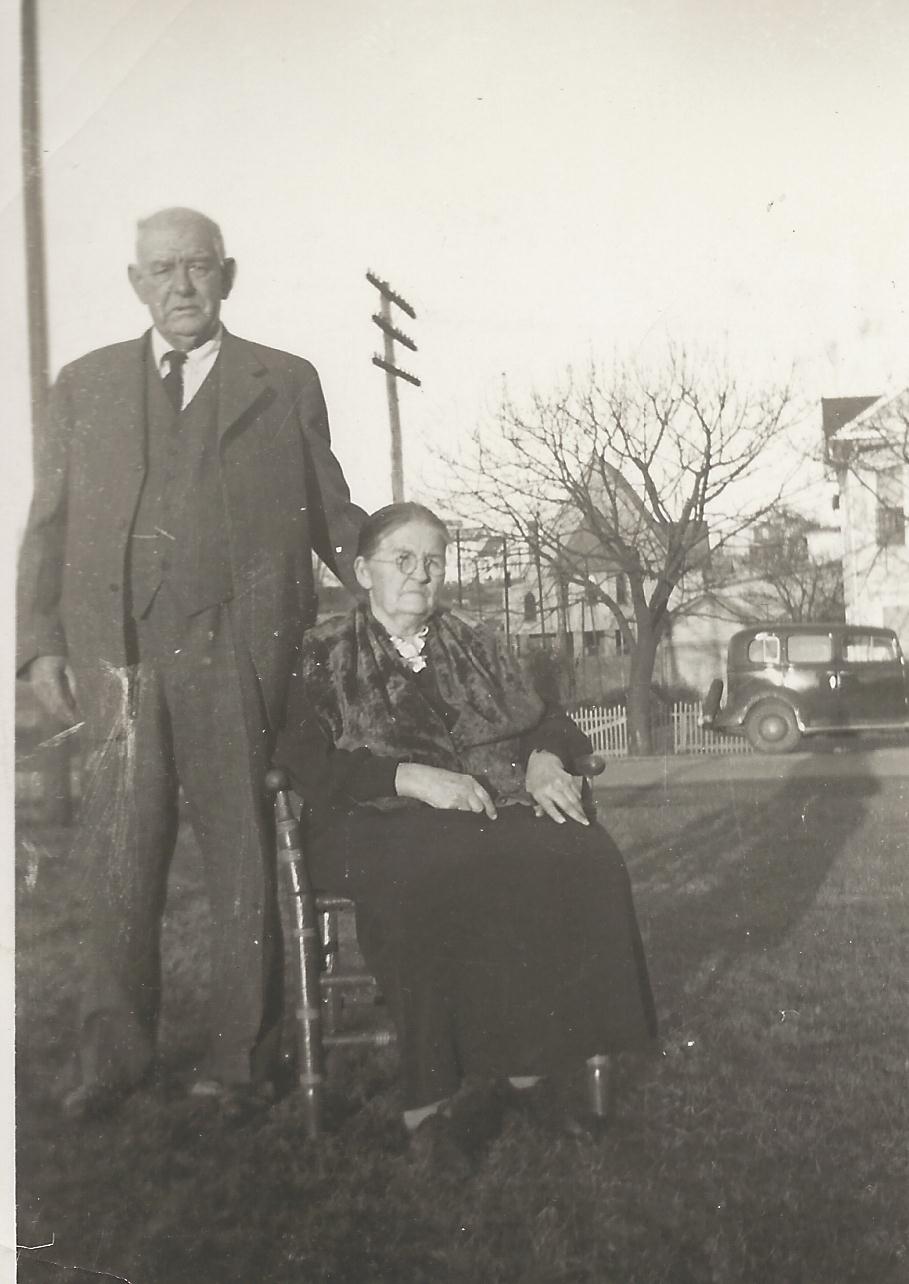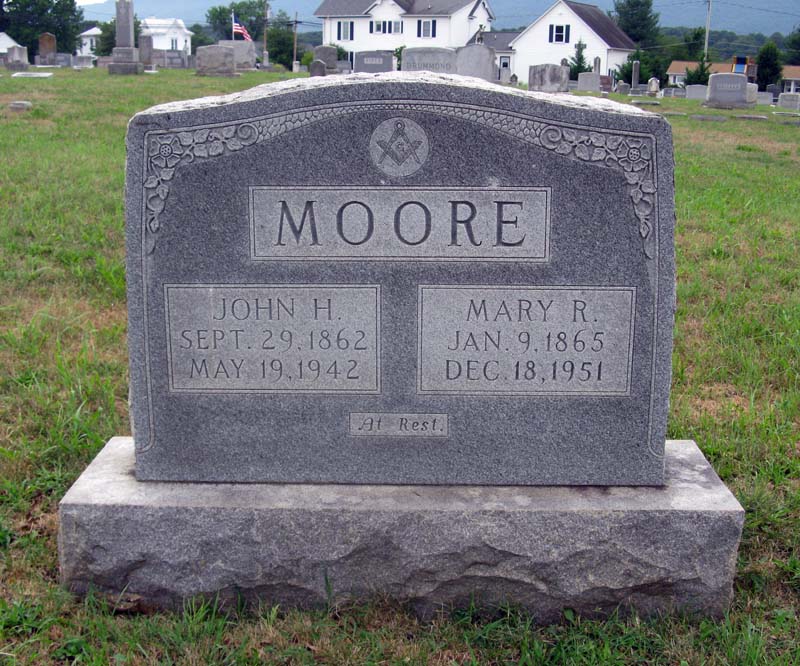John Howard Moore was born the fourth son of Cyrus and Catherine Hower Moore near Four Locks, Md. on September 29, 1862. It might be possible that he was named for a friend of the family in Clear Spring - Jonathan Hower -though the name had been modified somewhat from Jonathan Hower to John Howard. Jonathan Hower was married at the time to Elizabeth Margaret Moore, Cyrus Moore's oldest sister. Jonathan and Elizabeth Moore Hower named their only child Kate Sanders Hower - Kate possibly for Catharine, Cyrus Moore's wife and Sanders for Elizabeth's mother's maiden name. John Howard Moore grew up during the Civil War in the area of the town of Clear Spring until his parents moved to Martinsburg after the war.
He attended school in Martinsburg, and was listed in the 1880 census in Martinsburg while 18 years old and living with his parents and three younger siblings. He could read at this point while his younger siblings could not. At this time, John Howard's brother ,James Draden Moore, was working in Salem, Va.
Between 1882 - 1885, John Howard headed west. At some point, perhaps 1885, he and Mary Davison met (likely in Kentucky). They married in Desoto, Kansas on Sept. 30, 1886. When they were heading out west to settle, Molly was pregnant and had a breach birth (Katie W. Moore who died 9/30/1887, the day after she was born). When she went into labor they placed hot coals in her hands to distract from birth pains. When the baby died the plans to head west changed. Eventually, they made their way back to Kentucky (their first son, William Cyrus Moore was born in Hardin County, Ky. on 12/22/1888) and then, I think western Maryland/Southern Pa. At this point, they gave up on going west, probably returned to her parents house and then went to his parent's house which, at the time, was probably in Chambersburg, Pa.
Supposedly after he had secured a job with the railroad and while he was working on the railroad that went into Shenandoah at sometime, saw the farm land that he wanted on Naked Creek. This is what brought him eventually to Shenandoah, after purchasing the land which was originally divided up into three deeds.
On September 19, 1889, he appeared in a newspaper clipping which stated: "Mr. Moore, of Shenandoah, was in Luray this week with a carload of horses from that county for shipment north over the Shenandoah Valley Railroad."
After moving to the homeplace on Naked Creek, Nell was born in June 1891, Hume was born at the homeplace in August 1896. On May 24, 1896, Howard signed a new deed for "Lots No. 26 and 27 in Block No. 3 of Miller's addition to the town of Shenandoah, fronting each 50 feet on Third Street, and running west 130 feet with Milnes Street to an alley...." He paid $157 total "to be paid as follows.... Forty Dollars cash.... and eleven bonds for Ten Dollars each, payable one each month for eleven months from this date...." Apparently they did not move to the new address on Second Street until sometime after Hume was born. Annetta followed as the last child in November 1898.
Howard, also referred to as "Blinky" because of an eye spasm type of twitch, worked for the Norfolk & Western R.R. at Shenandoah, making his first run with T.B. Davis (who attended his funeral in 1942) in 1890. A story passed down says that he was known for climbing out on the engine and taking off the train whistle and replacing it with a steamboat whistle. He then commenced to playing music as the train came down the mountain. Sometime during his years as a trainman, a boiler exploded and he was severely scalded. The scars were plainly visible for years on his legs.
Though residing in Shenandoah, Va., in 1894 he was serving as an officer ("receiver") with the Antietam Lodge #512, Brotherhood of Local Firemen and Enginemen, in Hagerstown, Md.
He was a member of the Episcopal Church and became a Freemason and member of the Ashlar Lodge #125 in Shenandoah, Va. in 1900. (However, obituary states member of 43 years as of 5/1942). From the official lodge records, Howard's application was read 8/11/1900 (petition was signed by Charles H. Donn & L.F. Brown). Initiated to 1st degree 9/22/1900. Examined as entered Apprentice 1/12/01. Passed to fellowcraft 3/9/1901. Examined on the fellowcraft and raised 7/13/1901. Listed as Tyler 12/27/01. J.M. Haney was Worshipful Master at the time (1900 - 1903). On November 20, 1902 the lodge bought the old bank building for use as a lodge. Paid $450 for some, $100 down and borrowed the balance from J. Howard Moore over a period of 5 years and he took a deed of Trust against the same. Was "well known as an instructor among the candidates...." J.D. 2/14/03. JW, 7/4/04. WM 9/10/04. Listed as "Master of Vails", Royal Arch Chapter, Milnes Royal Arch Chapter No. 16, Shenandoah.
On July 8, 1911, the Ashlar Lodge was called upon to lay the cornerstone of St. Peter's Church. J.H. Moore was Worshipful Master (1911 - 1912, and 1936 - 1937).
1921: Mentioned in Railway Carmen's Journal: "Dealers Try to Check Co-Operative Movement. When the 750 workers of the Norfolk and Western Railroad, at Shenandoah, Va., launched a campaign to establish a co-operative store, the merchants of that city held a conference and discussed the possibility of checking the plan with injunction proceedings. This proving impracticable, they sought to lease all buildings available for store purposes, and would have succeeded in embarrassing the co-operators had it not been that H.B. Reid and J.H. Moore, two workers, own property that could not be secured by the profiteering dealers. These men are members of organized labor.
The Shenandoah workers now have their association, with a maximum capital of $25,000, in shares of $10. No member can have more than five shares. Within thirty days the store will be open and members can purchase essential commodities at cost plus 1 cent profit for operating needs.
The workers of the Shenandoah district are just as earnestly interested in the Plumb Plan as they are in co-operation and intend to promote both to the limit. The latest venture goes off with every prospect of success and material benefit to its members, all of whom are members of organized labor."
After retiring from the railroad he became active in the coal and transfer business with my grandfather (Howard's grandson), Robert Fenton Moore. Also helped in founding the Shenandoah Union Store Corp. serving 12 years as VP and ten years as President.
After suffering from diabetes and "infirmities of age" for several months and having been a patient of Rockingham Memorial with surgeries in a five month time frame, John Howard Moore passed away at about 6:03 p.m., Tuesday, May 19, 1942 [ age: 79 y, 7 mos, 20 d). The Masonic funeral was conducted (by Mr. Julian Price of Luray) from the Baptist Church beginning at 2 p.m. on Friday, May 22. Reverends E. E. Sumpter and J.E. Tucker conducted the funeral. The active pallbearers were H.L. Kiblinger, I.W. Judd, H.H. Darr, J.W. Henderson, John Callary and F.C. Wilkes. Honararies were W.H. Strickler, H.B. Reid, F.A. Lankford, T.B. Davis, J.S. Price, G.C. Steele, A.J. Stepp, and H.C. Bickers. He was laid to rest in the United Brethren Cemetery, Shenandoah, Va.
Mollie, though she had long wanted to be laid to rest in her home state of Kentucky, was laid to rest beside Blinky in December, 1951.
*From the Harrisonburg Daily News Record, July 9, 1928:
"Father and Son Go To Court Over Dry Law
Luray, Va., July 1. - Father and son will thresh out differences at the next term of the Page Circuit court in a unique case.
The case grew out of a new town ordinance passed by the council of Shenandoah, railroad city of this county relative to the running of dogs at large within the city limits.
The two men, J. Howard Moore, retired railroad man, and Sergeant Hume Moore of the Shenandoah police force, came to differences when the son arrested the dog belonging to the father and incarcerated the canine in the new bastille that adorns the city. Whereupon the father swore out a warrant before a county justice charging that the law was not legal and that his son through enforcement was violating the fundamental principles of the law of the land. The son waived preliminary hearing and went to the Circuit court.
Meanwhile, the town authorities wearing of feeding and housing the canine, haled the owner before the town justice and assessed a fine against both owner and dog. The owner paid the dog fine to prevent his death but appealed his case."
John Howard Moore was born the fourth son of Cyrus and Catherine Hower Moore near Four Locks, Md. on September 29, 1862. It might be possible that he was named for a friend of the family in Clear Spring - Jonathan Hower -though the name had been modified somewhat from Jonathan Hower to John Howard. Jonathan Hower was married at the time to Elizabeth Margaret Moore, Cyrus Moore's oldest sister. Jonathan and Elizabeth Moore Hower named their only child Kate Sanders Hower - Kate possibly for Catharine, Cyrus Moore's wife and Sanders for Elizabeth's mother's maiden name. John Howard Moore grew up during the Civil War in the area of the town of Clear Spring until his parents moved to Martinsburg after the war.
He attended school in Martinsburg, and was listed in the 1880 census in Martinsburg while 18 years old and living with his parents and three younger siblings. He could read at this point while his younger siblings could not. At this time, John Howard's brother ,James Draden Moore, was working in Salem, Va.
Between 1882 - 1885, John Howard headed west. At some point, perhaps 1885, he and Mary Davison met (likely in Kentucky). They married in Desoto, Kansas on Sept. 30, 1886. When they were heading out west to settle, Molly was pregnant and had a breach birth (Katie W. Moore who died 9/30/1887, the day after she was born). When she went into labor they placed hot coals in her hands to distract from birth pains. When the baby died the plans to head west changed. Eventually, they made their way back to Kentucky (their first son, William Cyrus Moore was born in Hardin County, Ky. on 12/22/1888) and then, I think western Maryland/Southern Pa. At this point, they gave up on going west, probably returned to her parents house and then went to his parent's house which, at the time, was probably in Chambersburg, Pa.
Supposedly after he had secured a job with the railroad and while he was working on the railroad that went into Shenandoah at sometime, saw the farm land that he wanted on Naked Creek. This is what brought him eventually to Shenandoah, after purchasing the land which was originally divided up into three deeds.
On September 19, 1889, he appeared in a newspaper clipping which stated: "Mr. Moore, of Shenandoah, was in Luray this week with a carload of horses from that county for shipment north over the Shenandoah Valley Railroad."
After moving to the homeplace on Naked Creek, Nell was born in June 1891, Hume was born at the homeplace in August 1896. On May 24, 1896, Howard signed a new deed for "Lots No. 26 and 27 in Block No. 3 of Miller's addition to the town of Shenandoah, fronting each 50 feet on Third Street, and running west 130 feet with Milnes Street to an alley...." He paid $157 total "to be paid as follows.... Forty Dollars cash.... and eleven bonds for Ten Dollars each, payable one each month for eleven months from this date...." Apparently they did not move to the new address on Second Street until sometime after Hume was born. Annetta followed as the last child in November 1898.
Howard, also referred to as "Blinky" because of an eye spasm type of twitch, worked for the Norfolk & Western R.R. at Shenandoah, making his first run with T.B. Davis (who attended his funeral in 1942) in 1890. A story passed down says that he was known for climbing out on the engine and taking off the train whistle and replacing it with a steamboat whistle. He then commenced to playing music as the train came down the mountain. Sometime during his years as a trainman, a boiler exploded and he was severely scalded. The scars were plainly visible for years on his legs.
Though residing in Shenandoah, Va., in 1894 he was serving as an officer ("receiver") with the Antietam Lodge #512, Brotherhood of Local Firemen and Enginemen, in Hagerstown, Md.
He was a member of the Episcopal Church and became a Freemason and member of the Ashlar Lodge #125 in Shenandoah, Va. in 1900. (However, obituary states member of 43 years as of 5/1942). From the official lodge records, Howard's application was read 8/11/1900 (petition was signed by Charles H. Donn & L.F. Brown). Initiated to 1st degree 9/22/1900. Examined as entered Apprentice 1/12/01. Passed to fellowcraft 3/9/1901. Examined on the fellowcraft and raised 7/13/1901. Listed as Tyler 12/27/01. J.M. Haney was Worshipful Master at the time (1900 - 1903). On November 20, 1902 the lodge bought the old bank building for use as a lodge. Paid $450 for some, $100 down and borrowed the balance from J. Howard Moore over a period of 5 years and he took a deed of Trust against the same. Was "well known as an instructor among the candidates...." J.D. 2/14/03. JW, 7/4/04. WM 9/10/04. Listed as "Master of Vails", Royal Arch Chapter, Milnes Royal Arch Chapter No. 16, Shenandoah.
On July 8, 1911, the Ashlar Lodge was called upon to lay the cornerstone of St. Peter's Church. J.H. Moore was Worshipful Master (1911 - 1912, and 1936 - 1937).
1921: Mentioned in Railway Carmen's Journal: "Dealers Try to Check Co-Operative Movement. When the 750 workers of the Norfolk and Western Railroad, at Shenandoah, Va., launched a campaign to establish a co-operative store, the merchants of that city held a conference and discussed the possibility of checking the plan with injunction proceedings. This proving impracticable, they sought to lease all buildings available for store purposes, and would have succeeded in embarrassing the co-operators had it not been that H.B. Reid and J.H. Moore, two workers, own property that could not be secured by the profiteering dealers. These men are members of organized labor.
The Shenandoah workers now have their association, with a maximum capital of $25,000, in shares of $10. No member can have more than five shares. Within thirty days the store will be open and members can purchase essential commodities at cost plus 1 cent profit for operating needs.
The workers of the Shenandoah district are just as earnestly interested in the Plumb Plan as they are in co-operation and intend to promote both to the limit. The latest venture goes off with every prospect of success and material benefit to its members, all of whom are members of organized labor."
After retiring from the railroad he became active in the coal and transfer business with my grandfather (Howard's grandson), Robert Fenton Moore. Also helped in founding the Shenandoah Union Store Corp. serving 12 years as VP and ten years as President.
After suffering from diabetes and "infirmities of age" for several months and having been a patient of Rockingham Memorial with surgeries in a five month time frame, John Howard Moore passed away at about 6:03 p.m., Tuesday, May 19, 1942 [ age: 79 y, 7 mos, 20 d). The Masonic funeral was conducted (by Mr. Julian Price of Luray) from the Baptist Church beginning at 2 p.m. on Friday, May 22. Reverends E. E. Sumpter and J.E. Tucker conducted the funeral. The active pallbearers were H.L. Kiblinger, I.W. Judd, H.H. Darr, J.W. Henderson, John Callary and F.C. Wilkes. Honararies were W.H. Strickler, H.B. Reid, F.A. Lankford, T.B. Davis, J.S. Price, G.C. Steele, A.J. Stepp, and H.C. Bickers. He was laid to rest in the United Brethren Cemetery, Shenandoah, Va.
Mollie, though she had long wanted to be laid to rest in her home state of Kentucky, was laid to rest beside Blinky in December, 1951.
*From the Harrisonburg Daily News Record, July 9, 1928:
"Father and Son Go To Court Over Dry Law
Luray, Va., July 1. - Father and son will thresh out differences at the next term of the Page Circuit court in a unique case.
The case grew out of a new town ordinance passed by the council of Shenandoah, railroad city of this county relative to the running of dogs at large within the city limits.
The two men, J. Howard Moore, retired railroad man, and Sergeant Hume Moore of the Shenandoah police force, came to differences when the son arrested the dog belonging to the father and incarcerated the canine in the new bastille that adorns the city. Whereupon the father swore out a warrant before a county justice charging that the law was not legal and that his son through enforcement was violating the fundamental principles of the law of the land. The son waived preliminary hearing and went to the Circuit court.
Meanwhile, the town authorities wearing of feeding and housing the canine, haled the owner before the town justice and assessed a fine against both owner and dog. The owner paid the dog fine to prevent his death but appealed his case."
